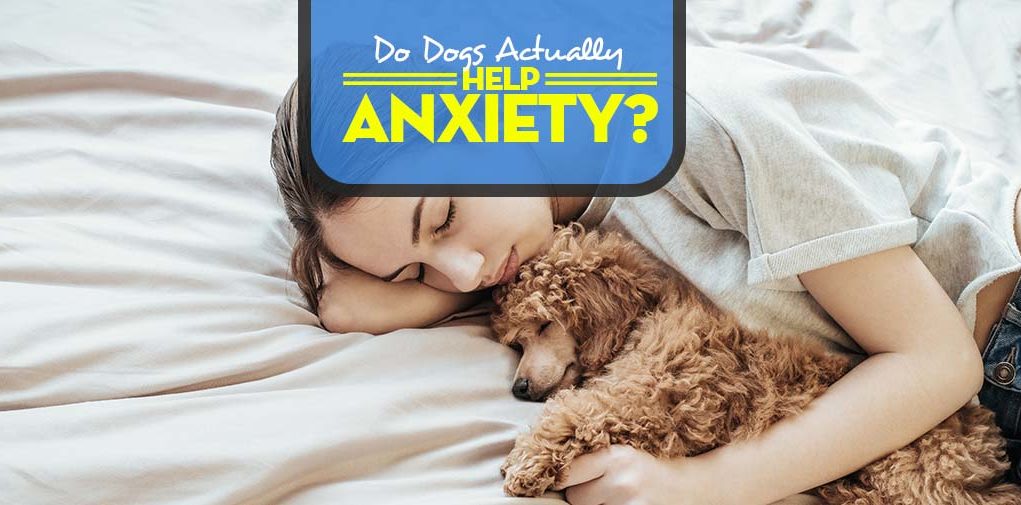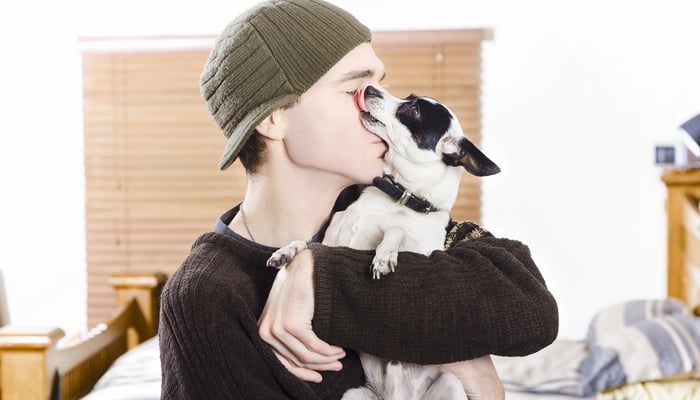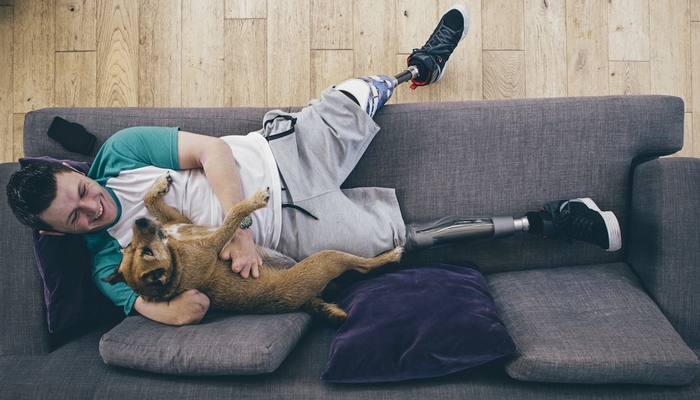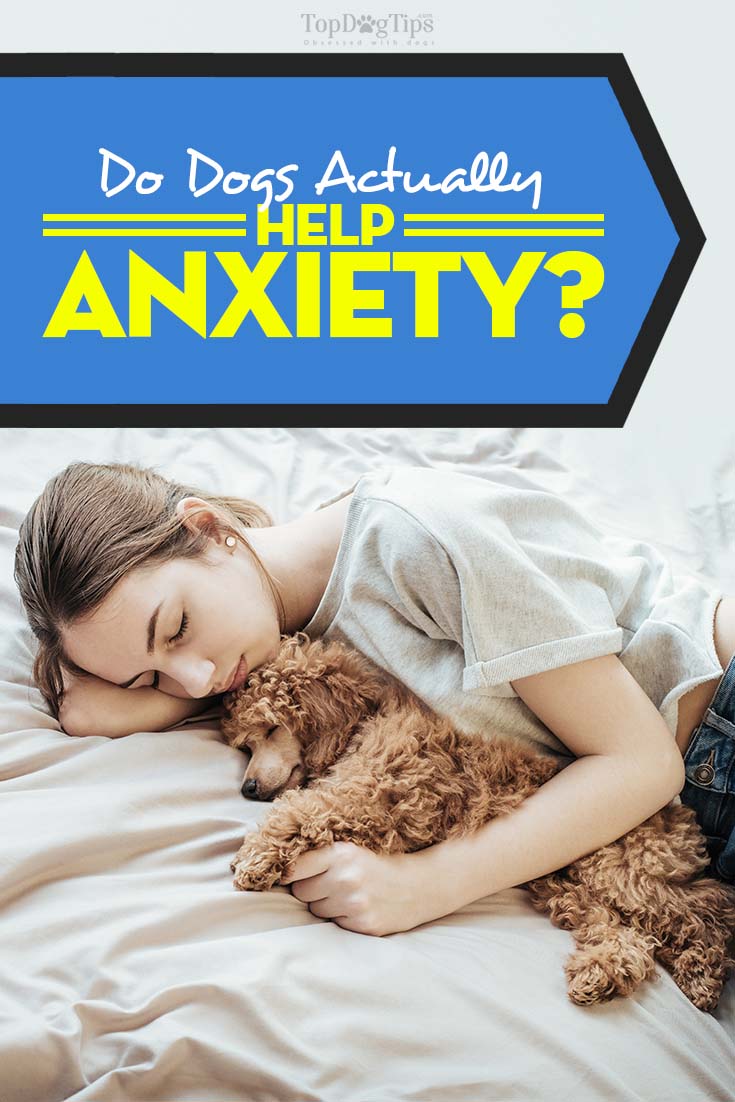You may have been feeling down or even have been feeling some anxiety and notice that these emotions are alleviated when your dog is near. Your dog may make you feel comforted or safe and allow you to better cope with your emotions. Do dogs help anxiety? If so, how?
Many Americans have registered Emotional Support Animals (ESA), and these animals provide support for emotional and psychiatric disorders that can include anxiety, post-traumatic stress disorder (PTSD), depression, and other psychiatric disorders. They do this by being a physical presence when their owner becomes emotionally distressed.
While many types of animals can help with depression and anxiety, dogs are special in that they can be trained to be service animals. They are also almost always active and extremely affectionate. Sometimes when you get down in the dumps, all it takes is your dog to lick your face and jump up on you to lift your spirits and turn your day around.
TIPS: How To Get A Service Dog for Anxiety or Depression & The Costs of It
Do Dogs Help Anxiety and How?
How Do Dogs Help with Anxiety?
Dogs make great service and companion animals, and there is formal research that shows that dogs are very effective at treating depression and anxiety. Those who suffer from anxiety and depression often avoid contact with the outside world.
Internally there can be a struggle that can involve emotional turmoil and negative self-talk. This internal negativity can become a vicious cycle that dogs can interrupt and break the spiraling unrealistic emotions that the person can be suffering from.
Dogs also offer companionship at a time when someone needs it the most, and in turn gives their owners a sense of purpose. There are many other ways that dogs help those who suffer from anxiety and depression.
Some of those ways include:
1. Responsibility
Dogs need to be taken care of, fed, watered, and walked. When someone is having a rough day, there is extra motivation in getting back to taking care of your loved one.
2. Unconditional love
Dogs help anxiety by giving their owners 100% unconditional love and do not judge, becoming the owners true best friend.
3. Recognize signs of a panic attack.
Dogs have a calming effect with the presence and non-reaction to a stimulus. They can be trained to intervene and block approaching strangers.
4. Social Connection
Those who have anxiety may also suffer from emotional disorders and have problems making an interpersonal connection. Dogs help anxiety by allowing the owner to feel connected.
5. Excellent Distraction
Those who suffer anxiety know that a small feeling can explode into something out of control very quickly. It can cause a complete shutdown. Dogs gives a focal point, as well as a calming presence.
6. Companionship
Those with anxiety disorders may also suffer from loneliness if they live alone. Having a dog beside you offers a constant companion, and someone who will always listen.
7. Provide Assistance
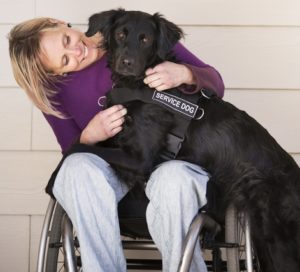 Some dogs are specifically trained to accomplish specific tasks and are certified psychiatric service dogs. These dogs can do additional tasks such as bring medications, phones, or go get help.
Some dogs are specifically trained to accomplish specific tasks and are certified psychiatric service dogs. These dogs can do additional tasks such as bring medications, phones, or go get help.
These dogs can help a variety of disorders. If your dog helps soothe your anxiety and depression then it could be an emotional support animal (ESA).
The National Service Animal Registry states that ESA’s are animals the by their very presence “mitigates the emotional or psychological symptoms” associated with the owner’s condition or disorder. This means that your own dog can be registered as an ESA or you can adopt a specially trained one.
There are times, however, that a person needs more help than an ESA can provide. If this is the case, they can apply to get a specially trained psychiatric support animal (PSA).
PSA’s can be trained to do things like get medications, bring help, or even search rooms. The difference is that a PSA is considered the same as a full-fledged service dog and an ESA is not. This can make a difference on where your dog may be allowed to go such as motels, restaurants, and markets. You should check the locations pet-friendly status.
RECOMMENDED: 25 Best Therapy Dog Breed List
Your Dog’s Legal Rights
Even though the National Service Animal Registry does not consider an emotional support animal (ESA) the same as a full-fledged service animal like a psychiatric service animal (PSA), a dog that is an ESA has certain legal rights. ESA’s have been given some of the same rights as service animals in areas like housing and air travel.
The Fair Housing Act includes ESA’s in its animal assistance act. Under the Fair Housing Act people with disabilities cannot be discriminated against when trying to obtain housing. This means rules such as no pets, pet deposits, pet size limitations and certain species-bans do not apply to ESA’s.
If your dog is an ESA you can thank the Air Carrier Access Act for allowing your dog to accompany you into the cabin of the aircraft on your next flight. To save time and hassle have all your necessary paperwork in order and with you when you arrive, and be sure to have called ahead and arranged for your dog to be with you on your flight so that the airline will be expecting you and your friend.
RECOMMENDED: Therapy Dog Training – How To Get Your Dog Certified
7 Best Breeds to Help with Anxiety
If you are currently in treatment for anxiety or depression and you haven’t yet chosen your special pup, you can be encouraged in knowing that adopting a dog can be a rewarding experience and an uptick in your treatment program. Dogs help anxiety because of their affectionate nature, activity levels, and their co-dependence.
When you are dealing with anxiety and depression, it can seem difficult enough to take care of yourself let alone another. Experts insist that adding a little responsibility can boost your mood levels by adding a different focus in your life. While you’re considering which dog to get to bring home and be your new best friend, you should consider that some breeds are better than others when it comes to consoling their owners.
These breeds include:
 1. Cavalier King Charles Spaniel
1. Cavalier King Charles Spaniel
This is an extremely cute fluffy dog with a neediness of its own, it loves to cuddle. This cuteness and cuddling helps owners fight depression, but these dogs do require a lot of grooming so that should be considered before adoption.
 2. Labrador Retriever
2. Labrador Retriever
Labrador Retrievers are great big dogs with sweet, loving, happy demeanors. They are eager to please, but love to go outdoors, and have fun. Be ready to go for daily walks.
 3. Poodle
3. Poodle
Poodles are highly intelligent dogs that connect with their person. They are also great with kids and hypoallergenic. Dogs help anxiety, and the Poodle is one of the best breeds for the job!
4. Golden Retriever
 These dogs show their owners a great unconditional love that knows no bounds. They are also extremely athletic and love to play, encouraging their owners to get out. Highly intelligent, the Golden Retriever makes a great service dog in any capacity.
These dogs show their owners a great unconditional love that knows no bounds. They are also extremely athletic and love to play, encouraging their owners to get out. Highly intelligent, the Golden Retriever makes a great service dog in any capacity.
 5. Yorkshire Terrier
5. Yorkshire Terrier
Yorkies are gorgeous little dogs and are known for being adorably cute. They are also extremely intelligent and loving, making them great as a sweet best friend. Not to mention, their small size makes them ideal for owners who want to travel with their pet.
 6. Viszla
6. Viszla
Not a well-known breed, these dogs are like Velcro to their owners. They love them so much and become strongly attached in no time. Incredibly smart, Viszla’s also like to clean themselves as much as cats. Their high intelligence also makes them easy to train.
 7. Pug
7. Pug
Pugs are generally funny to look at, but who would have known that they had a funny personality too? They also manage to keep a steady positive temperament, despite the look on their face. These dogs help anxiety, and make great family pets too.
READ NEXT: Science On Therapy Dogs for Depression – Fact or Fiction?


